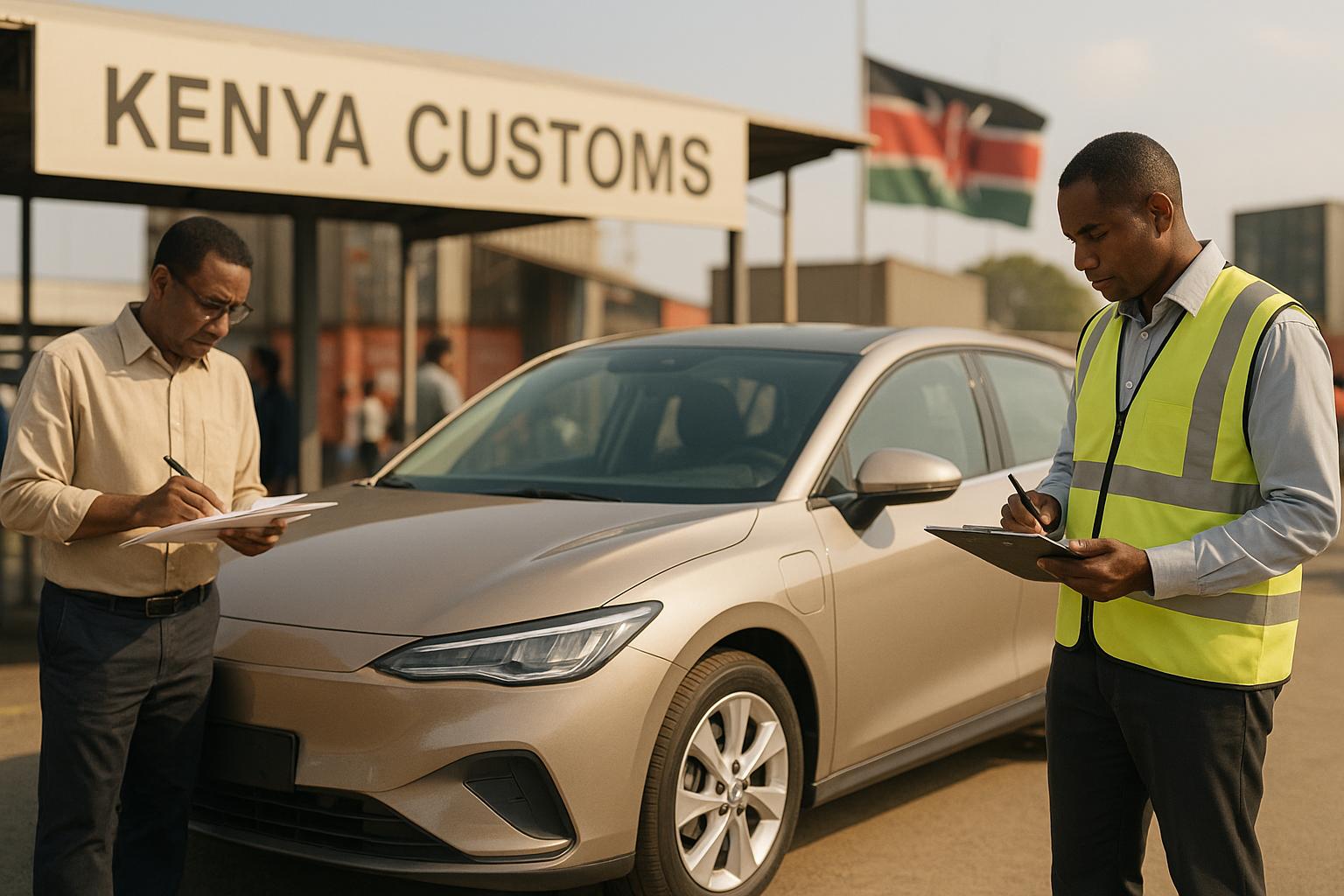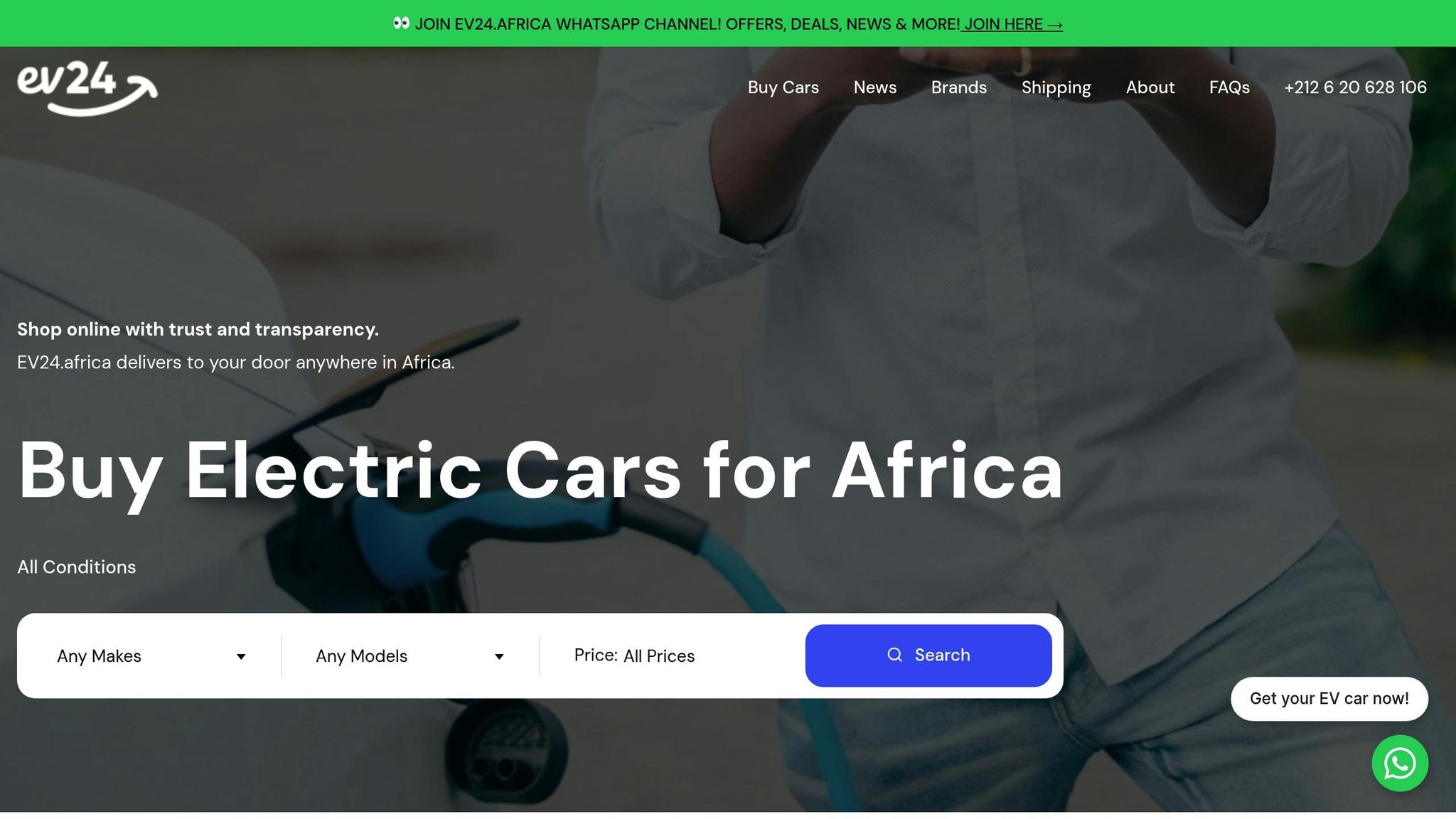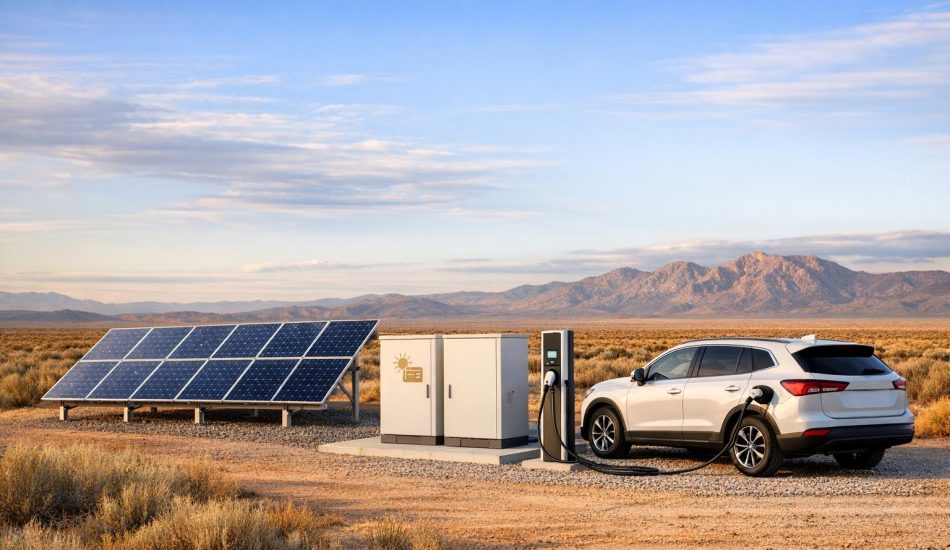
Kenya is rolling out new electric vehicle (EV) import rules starting in 2025, aiming to boost EV imports to 5% of all vehicles. These changes include stricter quality standards, updated tax structures, and new documentation requirements. Here’s a quick summary of what you need to know:
- Battery Health Standards: Imported EVs must have at least 80% of their original battery capacity. Pre-shipment certification is required.
- Age Limit: Only EVs registered on or after January 1, 2018, are allowed (8-year maximum age).
- Right-Hand Drive Only: Vehicles must match Kenya’s road system.
- 10% Excise Duty: A flat rate applies, alongside other taxes based on the vehicle’s retail price.
- Tax Breaks: Electric motorcycles, bicycles, and buses are VAT-exempt, but cars are not.
- Pre-Inspection Rules: Thorough documentation and valuation are mandatory to avoid delays.
- Unlisted Models: Importing unlisted EVs requires manual valuation by the Kenya Revenue Authority (KRA).
- Government Goals: A 5% EV import target and plans to expand charging stations are underway.
These rules aim to ensure quality while addressing challenges like high costs and limited awareness. Platforms like EV24.africa can help buyers navigate compliance and logistics. Preparation and understanding these regulations are key for a smooth import process.
Used Cars Importation Rules [KEBS New Regulations Effective Jan 2025]
Battery Health Standards Now Required
Starting in 2025, Kenya’s new regulations for importing used electric vehicles (EVs) will enforce a benchmark for battery performance. These rules aim to ensure that imported EVs maintain dependable functionality while aligning with environmental goals. Here’s a closer look at the specifics and how they might affect costs.
80% Minimum Battery Life Rule
To qualify for import, used EVs must retain at least 80% of their original battery capacity. For instance, if a vehicle initially came equipped with a 60 kWh battery, it must still have at least 48 kWh of usable capacity. This ensures the vehicle can deliver reliable performance and meet operational expectations.
Battery health is assessed by comparing the current battery capacity to its original factory specifications. This standardized approach provides a clear and measurable way to verify compliance with the new rules.
Pre-Inspection and Certification Process
Before importing a used EV, importers will need to secure a certification verifying that the vehicle’s battery meets the 80% health threshold. This certification must be obtained through an approved diagnostic test conducted prior to shipment. The results will then form a critical part of the documentation required for regulatory approval.
Cost Impact for Buyers
These new requirements may influence the overall cost of importing a used EV. Buyers should factor in inspection and certification fees, which could affect the market price of compliant vehicles. When planning a budget for an EV purchase, it’s important to include these additional costs to avoid unexpected expenses.
New Age and Drive Configuration Rules
Kenya has introduced updated regulations for importing electric vehicles (EVs), focusing on strict limits regarding vehicle age and requiring right-hand drive (RHD) configurations. Here’s a closer look at the requirements and the necessary documentation to meet these standards.
8-Year Maximum Age Limit
Under the new rules, imported EVs must not exceed 8 years of age. Starting January 1, 2025, only EVs with a first registration date of January 1, 2018, or later will be allowed into Kenya.
"We wish to notify all importers of used/second-hand motor vehicles including returning residents, diplomatic staff and the general public that in observance of clause 2.5 of KS 1515.2000 on the eight year age limit requirement, only Right Hand Drive (RHD) motor vehicles whose Year of First Registration is from 1st January 2018 and later shall be allowed into the country effective 1st January 2025" – Kenya Bureau of Standards (KEBS)
It’s crucial for buyers to confirm the first registration date of any EV they intend to import. The vehicle’s condition, no matter how good, won’t matter if it doesn’t meet the age restriction.
Right-Hand Drive Only
All EVs imported into Kenya must have a right-hand drive (RHD) configuration, aligned with the country’s road systems where vehicles drive on the left side. Left-hand drive vehicles are generally not allowed unless granted special government approval.
"All left hand drive vehicles are not allowed for registration unless they have a special purpose." – Simba Shipping
Required Compliance Documents
To ensure compliance with these regulations, specific documentation is mandatory. A Certificate of Roadworthiness (CoR), issued by a KEBS-contracted inspection agency, is essential. This certificate confirms the vehicle meets safety and technical standards.
Approved agencies for CoR issuance include Quality Inspection Services Inc. Japan (QISJ) for vehicles originating from Japan, as well as certified agencies in other exporting countries such as the United Arab Emirates, United Kingdom, Thailand, Singapore, and South Africa.
The pre-shipment inspection process validates key details like the registration date, drive configuration, and overall condition of the EV. The results must accompany the vehicle’s documentation at Kenya’s port of entry.
Other critical documents include the Pre-Inspection Certificate, which verifies the vehicle was properly evaluated before shipment. Customs officials will review these documents alongside the CoR to confirm the vehicle meets Kenya’s import standards.
Complete and certified documentation is non-negotiable. Missing or incomplete paperwork can lead to delays, extra fees, or even rejection at the port of entry, so it’s essential to double-check all requirements before shipping.
Import Duty and Tax Changes
Kenya’s updated tax structure for electric vehicles (EVs) significantly increases final costs – by as much as 60–70% compared to duty-free prices. If you’re considering importing an EV, it’s crucial to factor these taxes into your budget. These changes build on previous regulatory adjustments, further impacting the overall cost of importing EVs.
10% Excise Duty Rate
Electric vehicles imported into Kenya are subject to a flat 10% excise duty, regardless of the vehicle’s battery size or motor capacity. This fixed rate stands in contrast to the variable excise duties applied to conventional vehicles. Back in 2019, the excise duty for EVs was reduced from 20% to 10% – a step intended to encourage EV adoption. However, even at this reduced rate, the excise duty significantly increases the overall cost when combined with other taxes.
CRSP-Based Tax Calculations
Kenya calculates all import duties and taxes based on the vehicle’s Current Retail Selling Price (CRSP). Here’s how it works: First, a 25% import duty is applied to the CRSP. Then, the 10% excise duty is added, followed by VAT. For example, a BYD Sealion 7 with a base price of 8.7 million Kenyan shillings (approximately $67,180) ends up costing 12.6 million Kenyan shillings ($97,300) after the import duties. Once VAT is included, the total rises to nearly 14.6 million Kenyan shillings ($112,740).
Available Tax Breaks
Kenya’s Finance Bill 2025 does provide some VAT exemptions for certain types of electric vehicles and related components. Electric motorcycles, bicycles, buses, and solar batteries benefit from zero VAT rates, making them more affordable and aligning with efforts to promote sustainable transportation. Additionally, locally assembled vehicles and parts receive extra relief under the bill, supporting Kenya’s push for greener infrastructure.
However, electric cars are notably excluded from these tax breaks. As CleanTechnica observed, "the import duty and taxes levied on electric cars in Kenya are ridiculously high, especially for a country that tries to promote the green economy". This cautious approach contrasts with the more aggressive tax reductions seen in nations like Ethiopia, Mauritius, Rwanda, Zambia, and Zimbabwe.
When planning an EV purchase in Kenya, it’s essential to account for the full range of taxes and duties to avoid surprises. These costs can significantly impact the affordability of electric cars in the country.
Pre-Inspection and Certification Rules
Kenya has introduced updated pre-inspection and certification requirements, which must be carefully adhered to. Missing or incomplete valuation details can lead to frustrating delays in the import process.
Documentation and Valuation Considerations
The CRSP list, last updated in June 2020, primarily includes the Nissan Leaf. For other EV models, manual input and additional valuation documents are necessary. This makes precise valuation critical for ensuring a smooth import process. Proper and thorough documentation is essential to comply with Kenya Revenue Authority (KRA) guidelines and avoid unnecessary setbacks.
Avoiding Import Delays
To prevent delays, it’s wise to consult the Kenya Revenue Authority (KRA) or work closely with your clearing officer to understand the exact steps and valuation requirements. Companies like Charge Ninja offer comprehensive services, including vehicle selection, quality inspection, and logistics, to help navigate Kenya’s shifting EV import rules.
sbb-itb-99e19e3
Model Approval for Unlisted EVs
Bringing in unlisted EV models involves a manual process to establish the CRSP (Current Retail Selling Price) for duty calculations. Since many EV models are not pre-listed, this manual determination ensures fair and consistent duty assessments for unique imports.
Getting New Models Approved
To begin, you’ll need to prepare a Proforma Invoice that outlines the EV’s specifications and pricing. This document should include details such as the vehicle’s condition, features, and price, as it will be used by the Kenya Revenue Authority (KRA) for valuation purposes.
For any unlisted EV – be it a Tesla Model 3, BMW i3, Hyundai Kona Electric, or another make – you’ll need to collaborate directly with the KRA to establish its fair market value.
Working with KRA
Once your Proforma Invoice is ready, the next step is to seek validation from the KRA. Present the invoice along with complete details about the vehicle to either the Kenya Revenue Authority or your clearing officer. This step is essential for determining a fair CRSP.
Keep in mind, this manual valuation process can take longer than importing models with pre-determined CRSP values. To avoid delays, it’s a good idea to start the process well ahead of your vehicle’s arrival.
Government EV Targets and Infrastructure Plans
In response to updated import rules and tax policies, the government has introduced additional measures to encourage the adoption of electric vehicles (EVs). These initiatives aim to align with Kenya’s broader goals while addressing practical challenges for buyers. Together, these efforts lay the groundwork for the regulatory changes previously discussed.
5% EV Import Target by 2025
Kenya has set its sights on achieving a 5% EV import target by 2025. This move is part of a broader strategy to make EVs more accessible and appealing. The new regulations focus on enforcing strict quality standards, including battery performance and vehicle age requirements. By doing so, the government hopes to boost consumer trust and encourage wider adoption of electric vehicles.
Charging Station Expansion
To support the anticipated increase in EV usage, plans are underway to expand the charging infrastructure. The government, working closely with private sector partners, is prioritizing the installation of charging stations in urban areas and along major transportation routes. This collaboration ensures the charging network keeps pace with the growing number of EVs, making them a practical option for daily use.
Environmental Policy Connection
These initiatives are closely tied to Kenya’s environmental goals. By enforcing quality standards for imported EVs – such as stringent battery and age requirements – the government aims to enhance their long-term efficiency and minimize environmental impact. These measures also align with Kenya’s renewable energy efforts, reinforcing the nation’s shift toward cleaner and more sustainable energy solutions.
Using EV24.africa for Import Compliance

Navigating Kenya’s EV import regulations can be challenging, but EV24.africa simplifies the process for buyers by offering a user-friendly platform tailored to meet the country’s updated EV standards. This online marketplace connects buyers with electric vehicles (EVs) that include clear specifications and pricing, making it easier to confirm compliance with key requirements.
Finding Compliant EVs on EV24.africa
On EV24.africa, each listing provides essential details like battery health, vehicle age, and drive configuration. This transparency ensures buyers can easily verify compliance with Kenya’s standards, such as the 80% minimum battery life rule and the 8-year maximum age limit. The platform features models from top brands, including Tesla, BYD, Leapmotor, Hyundai, and Toyota, giving users access to a variety of options that meet import requirements.
Additionally, the platform displays clear pricing, helping buyers understand the total costs involved. This information aids in budgeting and planning, while also supporting detailed pre-inspection evaluations.
Pre-Inspection Support Services
To help buyers address potential concerns before importing, EV24.africa works with certified service providers to conduct pre-inspection evaluations. These assessments focus on verifying battery performance and overall vehicle condition, ensuring buyers have confidence in their purchase.
Financing and Delivery Services
EV24.africa goes beyond inspections to make the entire purchase process more convenient. The platform provides financing options to ease the financial burden and handles shipping and delivery across Africa. Buyers in Kenya can rely on EV24.africa to manage logistics, from purchase to final delivery, allowing them to focus on choosing the right electric vehicle while enjoying a hassle-free import experience.
Conclusion
Kenya’s 2025 EV import rules bring stricter quality standards and simplified processes, introducing both opportunities and hurdles for potential buyers. Key updates – like requirements for battery certification, vehicle age, drive type, tax rates, inspections, and model approvals, along with a 5% import target – aim to shape a safer and more efficient EV market.
These regulations emphasize quality and safety. Battery standards and vehicle age limits are designed to maintain a modern, reliable fleet, while the 10% excise duty rate ensures consistent tax calculations. Buyers, however, should familiarize themselves with available tax incentives to make the most of their investment.
Preparation is key to navigating these new import rules successfully. This means checking battery certifications, ensuring vehicles meet age and drive-type criteria, gathering all necessary documents, and planning for inspection costs. For those eyeing newer EV models not yet approved in Kenya, understanding the model approval process is especially critical.
Once the import process is complete, Kenya’s expanding charging infrastructure adds to the appeal of EV ownership. But the real success lies in choosing compliant vehicles and adhering to the updated procedures.
To simplify this journey, platforms like EV24.africa offer invaluable support. They provide compliant vehicle listings, pre-inspection services, and end-to-end logistics assistance. With transparent pricing and detailed specifications, EV24.africa helps buyers make informed choices while staying fully compliant with regulations. This combination of clear guidance and reliable services ensures a smooth transition for buyers ready to embrace Kenya’s EV future.
FAQs
How will Kenya’s new battery health standards impact the cost and availability of used EVs?
Kenya’s new battery health standards for electric vehicles (EVs) now require used EVs to retain at least 80% battery capacity. This change is set to influence both the cost and availability of used EVs in the market. With stricter import rules, prices are likely to climb, as only vehicles with verified battery performance will qualify under the updated guidelines.
The upside? These regulations aim to ensure that imported EVs are more dependable and have a longer lifespan, which could help build trust among consumers. Although the availability of lower-quality used EVs may shrink, buyers can look forward to better-quality options that meet the standards and offer greater long-term value.
What do importers need to do to meet Kenya’s new EV import documentation rules for 2025?
To align with Kenya’s updated EV import rules set for 2025, importers need to ensure their vehicles meet the necessary standards. A crucial step is obtaining a Certificate of Conformity (CoC) from an approved inspection agent, which verifies that the vehicle complies with Kenyan regulations. Alongside this, essential documents like a valid commercial invoice, bill of lading, and Import Declaration Form (IDF) must be prepared and submitted during customs clearance.
It’s also important to adhere to the latest inspection protocols established by Kenya’s Bureau of Standards (KEBS). Make sure all documentation is accurate and formatted according to the specified requirements, including the use of the metric system. Staying updated on these regulations and collaborating with certified agents can help streamline the process and minimize any risk of delays or penalties.
How will Kenya’s expanded EV charging network support the new import rules and adoption goals?
The Kenyan government is allocating $47.2 million to establish 10,000 EV charging stations nationwide by 2030. The rollout will begin in 17 key towns located along major highways. This ambitious move aims to complement new EV import regulations by ensuring the infrastructure can handle increasing demand and make electric vehicles more appealing to potential buyers.
Kenya is targeting to have 5% of vehicles electrified by 2025. This initiative is expected to cut emissions and make EV ownership more accessible. A widespread charging network is a critical step in easing the shift to electric vehicles while aligning with the country’s environmental goals and economic strategies.




